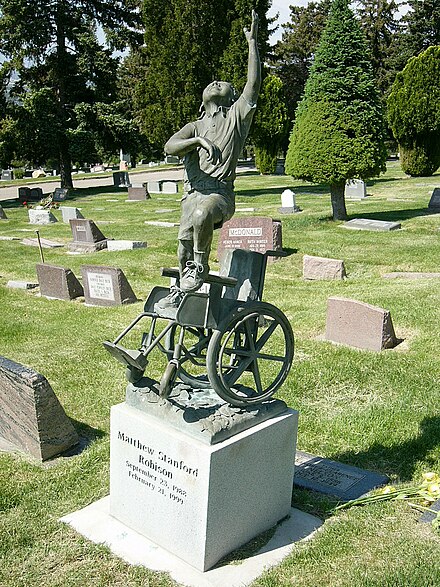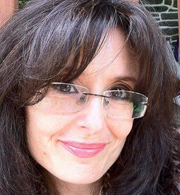
But the other day, I felt the need to post something apolitical, human and completely unusual for a person like me who wakes up with a desire to fight. It was the photo of a grave marker, but one unlike any other you might have seen.
The base of the headstone had the name and dates of the deceased. This was already a point of profound poignancy since he was a child named Matthew who'd died at the age of 11. But it was when you raised your eyes to look at the sculpture above the base that the breath went out of your body, and a very real and visceral jolt went through your heart.
Captured in stone was the image of a young boy reaching his arms up to heaven as he rose out of a wheelchair. Finally free.
I googled the name on the headstone, Matthew Stanford Robison. There was an actual Wikipedia entry, which explained the meaning behind the sculpture. Matthew had been deprived of oxygen at birth, and was born blind and partially paralyzed. He was confined to a wheelchair for his brief life, one in which he was surrounded by those who loved him deeply, and mourned him as deeply when he died at the age of 11. A photo of the boy shows a beautiful face, a wide smile and joy. He had no idea, it seems, that he was not one of G od's chosen.
To commemorate that life, his father Ernest commissioned the sculpture. It also stands as a tribute to every child who has suffered from a traumatic injury whether congenital or suffered after birth, like spina bifida, cerebral palsy, cancer, stroke or multiple sclerosis. Matthew's father and mother later established a foundation called "Ability Found" to help people with disabilities afford medical equipment and assistance.
It is impossible to look at this headstone without crying. Truly, if you do not at least feel a trembling in your soul, you are incapable of understanding the value of life as it is lived in real-time, in all of its flawed and random glory. And one of the reasons that I posted this photo on Twitter, Instagram and Facebook are because these are precisely the forums where beauty is massaged, exaggerated, falsified, curated and turned into something that diminished the radiance of real human beings.
We have become so accustomed to the filters on our photos and the ability to change features and fashion that encountering disability is a shock to the system. We need to be shocked, in order to avoid being anesthetized into disregarding the humanity in the least of these.
Roe vs. Wade had a very large role to play in our diminished tolerance for imperfection. While few people would admit that they've had abortions because they didn't want a damaged child, there are far too many instances where ultrasounds were used to guide parents into eliminating a child diagnosed in utero with a disability.
Ben Carson, the heroic world-renown pediatric neurosurgeon has written about his experiences repairing damaged children even before they enter this world. It is possible if the desire exists. But too many parents decide that they don't have space or time in their families for those challenges. Ana Navarro made that clear the other day on CNN when she described a brother with mental disabilities and a step-granddaughter with Down syndrome as burdens.
That choice still exists.
"Burdens" can still be eliminated, albeit not at the same level or as widely as before. But you cannot spend almost 50 years telling people that life has no value beyond the value given to it by the mother without absorbing the nihilistic principles of Nietzsche, the Super Man who was able to look down on the less gifted.
And that principle has transcended the boundaries of our own country. In India, ultrasounds are used to determine the sex of a baby, and if it's a girl she has a high probability of being aborted in some rural communities. The same thing happens in China. And in Iceland, nearly 95% of babies diagnosed with Down Syndrome in utero are aborted, to the extent that one report predicted that in twenty years human beings with that condition will disappear from the face of the earth.
Whenever you mention these things, there are those ready to attack you for being blinded by your able-bodied "privilege." You are told that since you can see and walk and hear and have a normal life expectancy, you do not have a voice in the conversation.
But if the able-bodied don't have a voice, how are those with medical disabilities supposed to defend themselves against an increasingly narcissistic society that misses the beauty in the damaged petals of an otherwise perfect flower?
As I watched my post gets shared and "liked" over and over again, I felt a bit of hope after so many years of despair. The language of "rights" has overtaken the reality of "life" and we have far too many people demanding the right to exert dominion over which lives matter.
Seeing the physical manifestation of a father's devotion preserved in stone for many decades after his child passed away was overwhelming. Here was a parent who perhaps had no choice in whether his son would live or die, and was helpless to give him back the sight and movement he was cheated by fate.
But he gave him love, the love to which we are all entitled from before the moment we emerge from the womb, perfect in our imperfection. And I am infinitely grateful to that father for reminding us of what we are capable of feeling, doing, and believing in when the rhetoric of "rights" is stripped away, and only the reality of life remains.
(COMMENT, BELOW)
Christine M. Flowers is a lawyer and columnist.


 Contact The Editor
Contact The Editor
 Articles By This Author
Articles By This Author